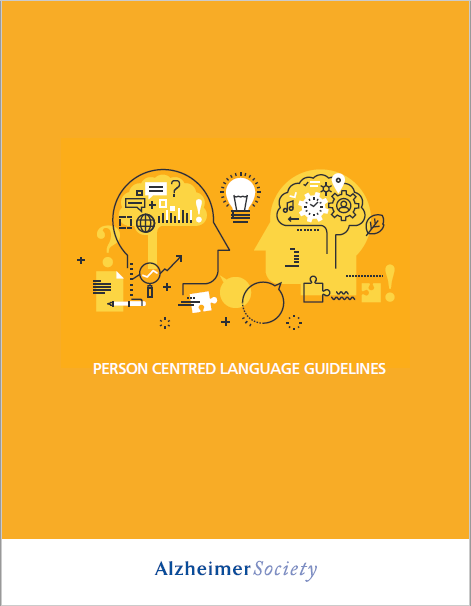Using person-centred language
The Alzheimer Society has developed language guidelines for anyone who lives with, supports, or works with a person living with dementia or caregiver. These guidelines can help you promote consistent, respectful language around dementia.

The information on this page is also available to read in a print-friendly PDF. Download Person-centred language guidelines or contact your Society for a copy. Also available as a single page summary.

Why use person-centred language when talking about dementia?
The power of words
Historically, language used to describe Alzheimer's disease and other dementias has largely focused on losses experienced by the person living with the disease.
While these losses are real, negative wording can promote stigma against dementia through perceptions, interpretations and approaches to care that focus on weakness rather than strength, illness rather than wellness, and victims rather than whole persons.
By being more conscious of the language we use, we can avoid reducing people living with dementia to a series of labels, symptoms or medical terms.
Human rights
The language that we use when talking about dementia should reflect the following human rights principles:
- Respect for dignity, autonomy, freedom to make choices and independence,
- Non-discrimination,
- Full participation and inclusion in society,
- Respect for difference; acceptance of disability as part of human diversity,
- Equality of opportunity,
- Accessibility and
- Equality among race, national or ethnic origin, colour, religion, gender, sex, age and mental or physical disability.
Language and behaviours
All behaviour has meaning. The way we behave can be a way of communicating distress, pain, frustration, loneliness, boredom and unmet needs, like hunger.
Responsive behaviours and reactive behaviours are terms commonly used to refer to behaviours exhibited by a person with dementia as a way of responding to something negative, frustrating or confusing in their environment.
The words we choose to use to describe a person’s behaviour should be person-centred and should help us understand what the person needs (see Preferred terms to use, below).
Cultural awareness
Using the term “dementia” may not be appropriate when talking with people from other cultures. If possible, learn about appropriate terms to use from people with the same cultural background as the person with whom you are working.
How to use these guidelines
You can refer to these guidelines whenever you talk about dementia – whether you're talking about dementia itself, a person living with dementia or someone caring for a person living with dementia.

If you're talking about dementia in a professional context (for example, as a healthcare provider, a financial professional or a journalist), we strongly recommend following these guidelines in your work, such as writing and reviewing policies and procedures, information resources, website articles and content or promotional or teaching materials. We also encourage you to share them with your colleagues.
Know that by using person-centred language, you are helping us tackle the fear and stigma surrounding Alzheimer’s disease and other dementias. The words that you choose can help make others more likely to acknowledge and discuss dementia in a way that doesn't use stigmatizing and reductive language.
Person-centred language to describe behaviours

Preferred terms
Describe the behaviour. Be as specific as possible, giving examples:
- For example: "The person strikes out when asked to undress".
- “Responsive behaviour” can be used for general situations, but specific descriptions (such as above) are preferred.
- Alternative to “sundowning” – for example: "The person seems to become restless at approximately 5-6 pm most days.
- For “wandering,” consider using "getting lost" or "losing one's way".

Non-preferred terms
- Acting out / Aggressive behaviour
- Agitation
- Challenging behaviour
- Difficult / Problem behaviour
- Hoarder / Hoarding
- Violent
- Screamer
- Sundowning / Sundowner
- Wandering / Wanderer
Rationale:
The non-preferred terms are not specific, suggesting that the behaviour is a result of a problem with the person. They do not support a person-centred response.
Person-centred language for talking about the person living with dementia

Preferred terms
- Person with dementia.
- Person living with dementia.
- The person; the individual.
- Dementia as a condition.
- A person with a diagnosis of dementia.
- A person living with dementia.
- Young onset dementia.
- Person with dementia or the name of the specific type of dementia.

Non-preferred terms
- Demented.
- Demented person.
- Senile dementia.
- Illness.
- Disease.
- Early onset dementia.
- Pre-senile dementia.
- Sufferer.
- Victim.
- Burden.
Rationale
- These terms suggest that the person is completely incapable.
- Dementia is described as a set of symptoms, unless talking about a specific dementia such as Alzheimer’s disease.
- Early onset and pre-senile dementia can be confused with the early stages of dementia.
- These terms add to the stigma and stereotypes surrounding dementia. They send the message that a life with dementia is not worth living, and that people with dementia have nothing to contribute.
- Using the preferred terms maintains the person’s dignity and focuses on the person, not on their condition.
Person-centred language to use for caregivers

Preferred terms
- Effects of caregiving
- Effects of providing care.
- Caregiver stress.
- Caregiver challenges.
- Meaningful caregiver experience.
Non-preferred terms
- Burden of caregiving.
- Caregiver burden.

Rationale
These terms imply that caregiving is always a burden. The individual interpretation of caregiving should be up to the caregiver.
Note that some prefer to use the term "care partners" when referring to the person caring for the person living with dementia. Refer to our section on terminology for more information.
Want to send your feedback?
The Alzheimer Society invites feedback on the usefulness of the current guidelines and suggestions of terms that might be included in future versions. Please email us with your input at publications@alzheimer.ca with the recommended subject line “Person-centered language guidelines”.
More useful links and resources
Person-centered language guidelines. Alzheimer Society. Whether you work to support people living with dementia, know someone who has dementia or just interested in using respectful, person-centred language, we encourage you to refer to and share this list of recommended terms to use in relation to dementia.
Person-centered language guidelines (one pager). Alzheimer Society. This one-page summary of our larger person-centered guidelines document condenses the list of recommended terms into three major categories: Dementia behaviour, talking about people living with dementia and caregivers.
Person-centred language resource and training. Ontario Centres for Learning, Research and Innovation in Long-Term Care (CLRI) and Behavioural Supports Ontario (BSO). Overview of the person-centred language in long-term care.
Implement person-centred language in patient documentation. Regional Geriatric Program of Toronto. Person-centred language toolkit for healthcare providers.
The power of language to create culture. Carmen Bowman, MHS; Judah Ronch, PhD; and Galina Madjaroff, MA, 2013. This paper investigates how developing and using new language can positively affect the way seniors feel and think about themselves and function on a day-to-day basis.
Anishinaabek Dementia Care. Resources for Anishinaabek communities seeking local and culturally relevant information about dementia.
Indigenous Cognition & Aging Awareness Research Exchange (I-CAARE) Dementia factsheets. Information about Indigenous perspectives and cultural understandings of dementia.
LivingMyCulture.ca. People from various cultures share their stories and wisdom about living with serious illness, end of life and grief to support others.
Native Women’s Association of Canada Knowledge Centre. Information and resources to help raise awareness of dementia within Indigenous communities.
